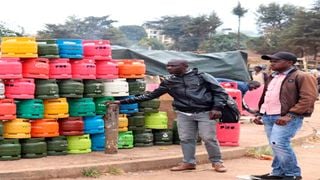
A customer shops for cooking gas in Kibera, Nairobi.
| Dennis Onsongo I Nation Media GroupNews
Premium
Cost of cooking hits a worrying all-time high
What you need to know:
- Many poor households that had switched to using cooking gas are scrambling back to their jikos.
- KRA will, from next week, begin effecting the revised excise duty rates to adjust for inflation.
Broken beds, old sofas, dusty cardboards and pieces of wood from demolished structures can be seen lined up in small piles beside roadside vendors who are roasting maize, sweet potatoes and cooking a variety of foods for their clients at Lindi in Kibera.
Other food sellers -- those who have run out of similarly unconventional fuel -- are filling their jikos with charcoal, which has become unbearably expensive in recent years.
For the residents, nothing has changed in years, except the sight of the daily construction work on the soon-to be completed Sh2 billion Ngong Road–Kibera–Kungu Karumba–Lang’ata Road that cuts through the populous area.
But the road, among hundreds across the country that have emerged as the government’s sceptre of development, also serves as a constant reminder of their neglect by the government, as their pockets and stomachs only get emptier, thanks to the rising cost of most basic goods.
Lindi’s residents mirror millions of Kenyans that are finding it increasingly harder to not only put food on the table, but also cooking it, after the rise in prices of kerosene, cooking gas, charcoal and firewood.
“We now have to use whatever we can get to prepare meals for customers. At the moment, it is becoming harder to buy firewood and charcoal because they have become expensive. But we get old furniture cheaper, which we use to cook,” says Mr Rufus Oloo, who runs a roadside eatery.
Cooking gas prices
Mr Oloo, who has lived in the area for decades, says it is becoming harder to get a profit from roadside food as an increase in cost of key inputs has pushed his running costs through the roof.
A charcoal seller in the sprawling slum who spoke to the Nation said it is becoming more expensive to get the charcoal after the government imposed a ban on logging, while transportation costs for the commodity, a significant number of which is imported from as far as Uganda and Congo, have also risen in recent months.
A spot check at various sellers established that a 2-kg container of charcoal is being sold at an average of Sh80 by most sellers, a steep rise from the Sh40 it used to cost just the other day.
“We used to sell this container at Sh40 or Sh50 just a few years ago. But we have had to raise the price just to stay in business,” he said.
With kerosene and cooking gas prices having risen sharply over recent months, many poor households that had switched to using cooking gas are scrambling back to their jikos, which has increased demand for charcoal and in turn pushed up its price.
Data from the Kenya National Bureau of Statistics (KNBS) shows the average price of a 13kg cooking gas hit Sh2,420 last month, a 17.4 per cent rise from a similar period last year after the product was slapped with a 16 per cent Value Added Tax (VAT) in July.
High kerosene prices
The price of kerosene also rose to Sh110.82 per litre, the highest the product has retailed in Nairobi since November 2018 when it hit Sh111.83 at the pump, following the latest monthly review by the energy regulator last week.
The new kerosene price comes after the government, from April, discontinued the subsidy that has been helping keep the cost of the commodity low, leaving consumers to shoulder an additional Sh12.97 per litre.
The high kerosene prices are a stark contrast to the low prices that consumers enjoyed just three years ago, giving a good view of how the cost of making a meal has gone up in that period.
This followed the introduction of the anti-adulteration levy in October 2018, following the enactment of the Finance Act, 2018, which put an additional Sh18 on each litre of kerosene to harmonise its price with that of diesel, and curb adulteration.
The levy has proved a costly burden for poor households as they painfully watched the price of kerosene shoot from Sh74.78 in January 2018, to Sh108.84 in October -- shortly after the levy was effected, a whopping 45.5 per cent increase.
But the situation is set to get worse before for kerosene users as the Kenya Revenue Authority (KRA) will from next week begin effecting the revised Excise Duty rates to adjust for inflation. KRA will charge importers Sh11,936 for each 1,000 litres, Sh565 more than the Sh11,370 it used to cost. This additional cost will be passed on to consumers through increased prices of kerosene.





